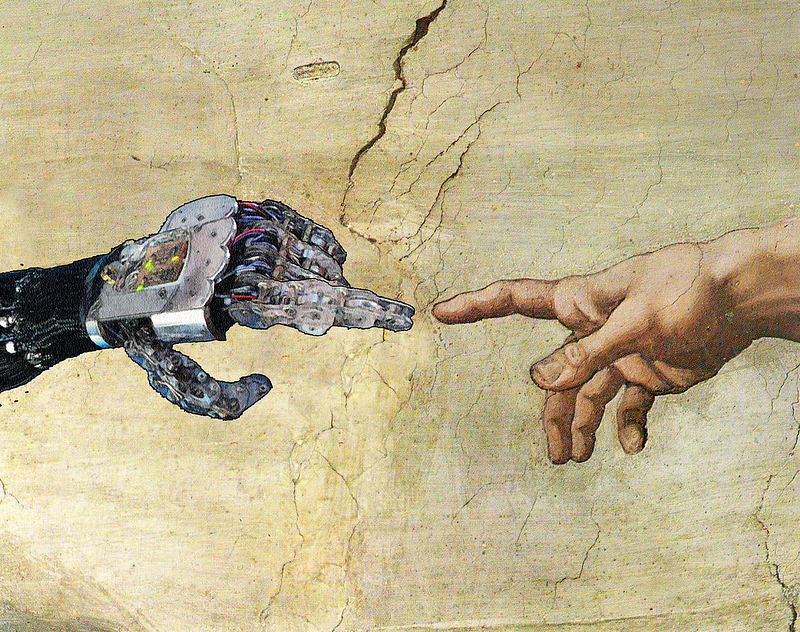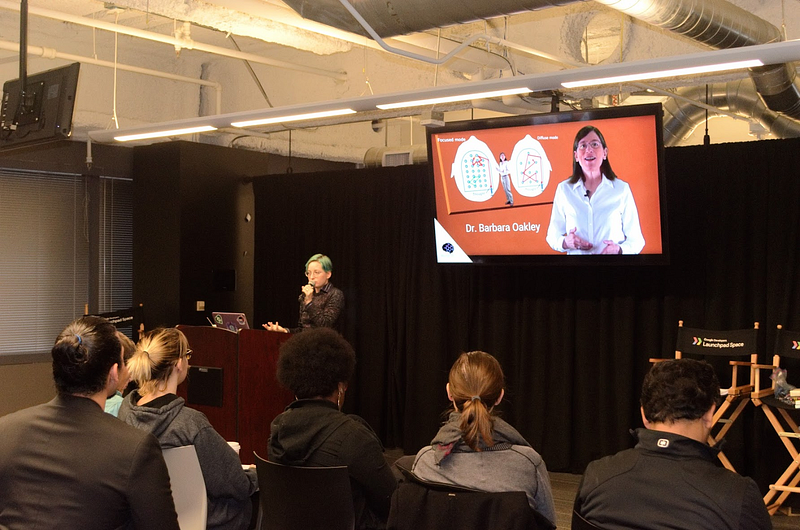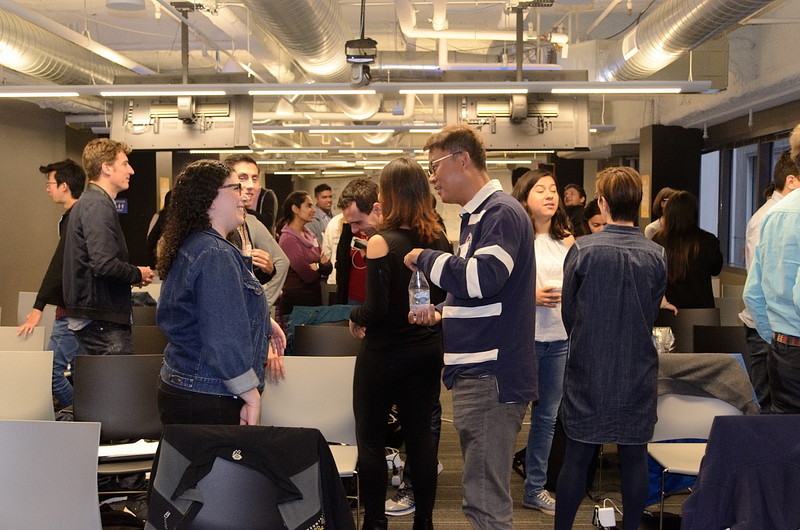Mindset Training for AI Engineers
As machines are becoming more human, are humans becoming more like machines?
We need to keep the humans human, and it starts with those who are designing artificial intelligence.

The number of people drawn to artificial intelligence (AI) engineering is seeing the same exponential growth as AI itself. Simultaneously, we are seeing an increase in the number of people who are looking at the world and seeing the need for change, for movement in the direction of a world that works for everyone. Whether or not you are interested in AI or in social change, I think we can all agree that AI systems have an effect on all of us, and this trend is something worth paying attention to.
Each new development by AI engineers has great potential to profoundly impact our society and the experiences of individuals within it. Engineers spend a great deal of time looking at lines and lines of code on a screen, getting deep into a project. Engineering intangible software has the potential to feel extremely isolating and at some point, people can start to think like the machine itself. This is the point at which the mindset of the people creating AI systems becomes vitally important, and where I see a need to take a step back from the computer screen and take a look at our humanity.
Mindset describes the various ways to approach life and the way that we experience the events in our lives. There is an isolation that comes with engineering, but isolation is a much bigger theme in our culture that affects us all. As we all suffer with the realities we are dealt, we are inundated by mainstream individualized ideals that often involve putting others down to get ahead, remaining straight faced and striving to fit the cookie cutter roles we think we choose for ourselves. Mindset can feel like an automatic response to the world around us, like something that is not fully within our control. The truth about mindset, however, is that with some effort and encouragement, it can be changed- and this can alter the future for the individual and for the world.
I believe that AI has the potential to be an actionable space for creating change in how we relate to each other, how we interact with our environment, and in ensuring a future where there is a habitable and equitable world for the coming generations. AI is already affecting these things. How it affects them can be influenced by the people who are driving it- if we can understand and utilize this power with intention and mindfulness.
When engineering AI systems and looking at data, the numbers on the screen typically represent living breathing humans that we don’t know and may never meet. We must face the reality that we are creating artificial intelligence systems that will affect people’s lives in ways that we don’t understand.
This is a monumental power, and a huge responsibility. Engineers, AI leaders, and data scientists are making decisions that affect a very large population. All of the various differences and needs of people are boiled down to cold hard data. There is a lot of fear around this, which we will address later in this article.
What is the solution to quell this fear?
In an effort to preserve and protect the humanity of the people creating the technology that is increasingly automating our world, I am leading workshops and trainings in Mastering Mindset for AI Engineers. This article digs into what these trainings entail, as well as the results I hope to see by doing this work.

(This photo is actually from my second workshop, at Google Launchpad during the Demystifying AI Event hosted by Accel.AI)
My First Mastering Mindset Workshop
The first time I got up in front of a room full of AI engineers, I felt like I was talking to people from an entirely different culture who spoke an entirely different language. In fact, most of them did understand multiple languages, ones they learned through tedious practice — the languages of coding.
My own language, based in a soft science from my years as an undergrad studying alternative medicine and then completing a master’s in anthropology and social change, felt like it provided a rough translation at best. They didn’t laugh at my jokes, but no one left the room, and everyone engaged with the exercises I gave them and with the research I presented. They listened. It is an interesting sensation when people start listening to you. Since that first workshop, I have learned and continue to learn about the culture of AI engineering.
Why would an anthropologist of social change want to hold mindset training workshops for AI engineers? Because I want to see real change happen in the world. And the fastest way to make change is through technology and especially artificial intelligence, which is moving at an exponential pace.
This rapid advancement is not without side effects. There is a lot that is broken in the world and these systemic issues are being repeatedly built into new AI systems, predominantly under the radar of the engineers creating it and testing it.
Bias, particularly from systemic racism, has already been built into algorithms we trust to make some pretty serious decisions. In a recent study on the effects of recidivism algorithms, ProPublica uncovered concerning trends in the population of people who are receiving longer prison sentences, showing that sentencing is heavily imbalanced based on race. Cathy O’Neil also addresses issues such as this in her recent book, Weapons of Math Destruction. She observed that, “Unless we specifically make sure that the models do not unfairly punish poor people or black people, we will end up with systems that do. And that is what we are seeing.”
This is something that we need to join forces on and find a way to do better.
What’s in the Workshops
Learning AI is not just about the technological aspects, but about the social implications, the emotional and personal impact, and the responsibility of wielding this power. What I can do is provide AI engineers with insight, research, and the tools that will help them to see the importance and the impact their work can and will have. Here is a small snapshot of the workshops I lead:
We start with Carol Dweck’s work on growth mindset: what it is, how to apply it to AI engineering, how to recognize where we are stuck, and push through as a team. We then turn to Barbara Oakley’s work on learning how to learn and strengthening the mind, then explore neuroplasticity and how the brain actually learns. We touch on imposter syndrome, prevalent in engineers, although we don’t like to talk about it. We look to Cathy O’Neil’s work on what she calls ‘weapons of math destruction’ to understand the serious implications of well meaning algorithms that create real harm to the underprivileged. We talk about values that affect AI. We set goals for our own careers, and we start to take steps to work towards them. And of course we get deep into mindfulness, and how it affects our work, our bodies, and our lives.
In my workshops I present research to support and encourage not only learning but compassionate humanity in the humans creating AI, as we understand how AI is affecting our shared world. What drives this all home is that we get up and do several group exercises and writing exercises to combine theory with practice, then talk about how this works and the dialectic of logic and emotion.
Through the workshops, I pose the question: Can we use this knowledge paired with practice to not only work for harm reduction, but towards something better?

(Another shot from my second Mindset workshop of engineers participating in a group exercise)
I Believe that People Care, and Through Care, Intention, and Hard Work, We Can Change the World.
Through these mindset trainings, I support people who care about our future and who want to work toward the equality of all people. I work to prove that we can put that care into action with the tools and skills available in AI engineering, using well researched methods of developing change and growth in mindset, while getting clear on what values and goals we hold by finding compassion around our differences.
We are in exciting times. There are many passionate and motivated people at the wheel, steering the way to the future- and AI is a powerful tool that will help to get us there.
There is nothing moving faster than the development of AI. If we can catch that train and take over the engine room, can we steer in the direction to equality and connection?
This is a call to action. How do we move from theory into practice? How do we create the change that we know needs to happen, now? We have the tools, the fire is built, all it needs is a little spark. I am offering that spark.
Check out my Mastering Mindset workshops. Contact me if you’d like to hold one for your group or company, and keep an eye on Accel.AI to see when workshops are happening- both for mindset training and technical AI training. Let’s combine forces, learn from each other, and work together towards a better world for everyone.
